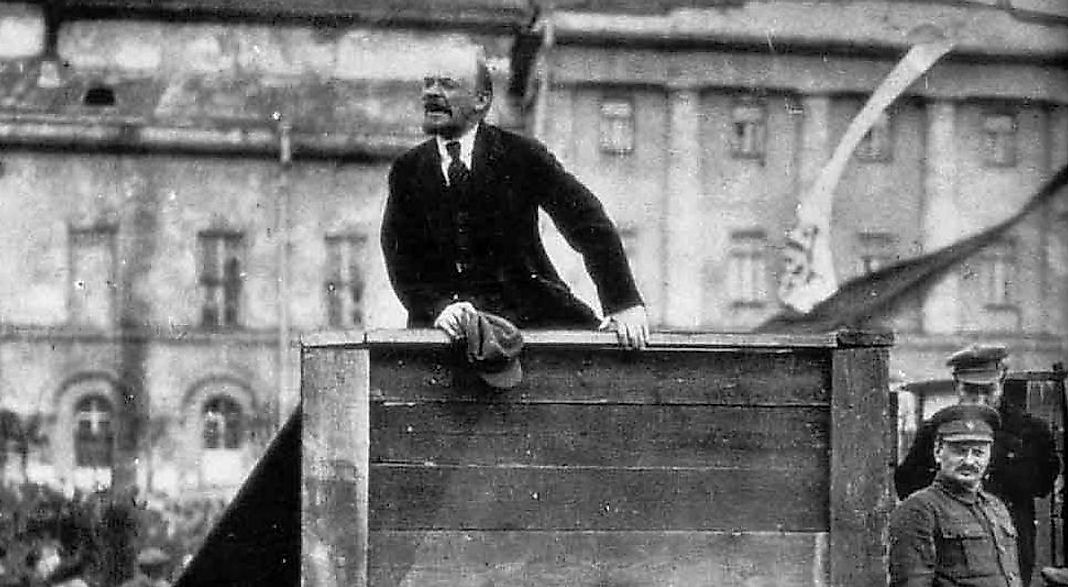Vladimir Lenin - World Leaders in History

5. Early Life
Lenin, born Vladimir Ilich Ulyanov on 22 April 1870 in Simbirsk, Russia, was the third of six children. Both his mother and father were well educated and considered highly cultured. They instilled a love of learning in all of their children. Vladimir was a strong student, a voracious reader, and graduated at the top of his class. There were two major turning points in his early life that seem to foreshadow Vladimir’s future in Russia’s evolution into communism. First, the death of his father in 1886 caused Vladimir to denounce his belief in God as well as the Russian Orthodox Church. Second, a year later when his brother Alexander, a university zoology student, was arrested and hanged for his part in a bombing plot to assassinate Tsar Alexander II. Accompanied by a great deal of anger and resentment, Vladimir continued his education at Kazan University and his experiences there created a driving force to study various revolutionaries and paved his way into politics.
4. Rise to Power
Not long into his first term at Kazan University, Vladimir was arrested and expelled for participating in student protests against the Tsar. Being exiled to his grandfather’s estate in a small village, he immersed himself in the study of radical literature, particularly Karl Marx, whose book Das Kapital was a major influence and by 1889 Vladimir was a self-professed Marxist. Finishing university and earning his law degree in 1892, he began working as a lawyer representing local peasants in Samara. This is where he witnessed the class struggles first hand and it is this experience that reinforced Vladimir’s Marxist beliefs. Continuing his work as a revolutionary, he moved to St. Petersburg where his leadership skills were quickly put to the test. Creating his own group of Marxists called the Bolsheviks; he was continually forced to hide from police and government officials. After being held by local authorities for attempting to publish an illegal newspaper, he was exiled to Siberia for three years. While in Siberia he married Nadezhda Krupskaya, a Marxist teacher. When 1900 brought his release from Siberia and ban from St. Petersburg, Vladimir changed his last name to Lenin in 1901 to confuse the authorities and spent the next few years in Western Europe writing communist papers. With World War I beginning in 1914 and the horrific treatment and death of millions of Russian soldiers, the Russian citizenry were prepared for a revolt. A revolt was staged in early 1917 and the Tsar Nicholas II abdicated from the throne. A provisional government was installed; however, with Germany’s help, Lenin and his band of Bolsheviks replaced the provisional government by the end of the year.
3. Contributions
As a communist philosopher and devoted Marxist, one of Lenin’s most profound contributions to the history and restructuring of Russia is his founding leadership of the Bolshevik Party. Although he was loved by some and hated by others, his ideologies coupled with those of Marx became known as Marxism-Leninism, and it did much to solidify the founding of a number of radical schools of thought that followed (Trotskyism, Maoism, Stalinism). Many of his writings are considered influential to the communist cause and include: What is to be Done?, Imperialism, the Highest Stage of Capitalism; The State and the Revolution, the April Theses, Left-Wing Communism: An Infantile Disorder and finally the New Economic Policy which helped revive the Russian economy through foreign trade, agricultural produce requisition and nationalization.
2. Challenges
Considered one of the most controversial leaders of all time, the continual struggles with promoting his Marxist causes and beliefs presented a monumental challenge to Lenin. Choosing the most fortuitous time to lead the Bolsheviks into power was a balancing act between timing and patience, but it was also pivotal in Lenin’s rise to power. His staunch rule and mass executions of any anti-Bolsheviks presented a challenge to the citizenry, causing resentment and resulting in an assassination attempt on Lenin’s life. Surviving the wounds to his neck and shoulder, his health was never the same.
1. Death and Legacy
After a series of strokes, Lenin died in 1924. Thousands of mourners paraded by his exposed coffin that lay in a mausoleum in Red Square in Moscow. Lenin’s mausoleum has been open to the public since he died—minus the four years that his body was removed and taken to Siberia during WWII. The founding father of the Bolshevik Party and the first leader of the Soviet Union are legacies that have sealed his rank as one of the most influential and controversial leaders of the 20th century.







